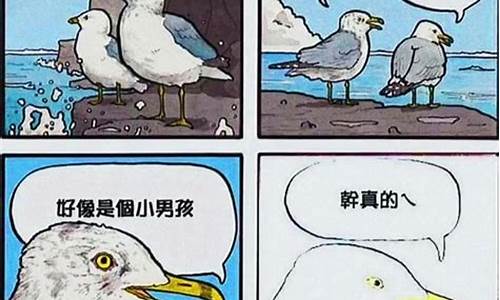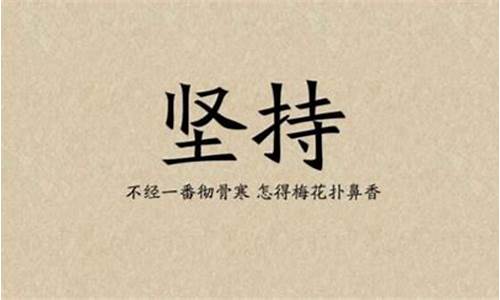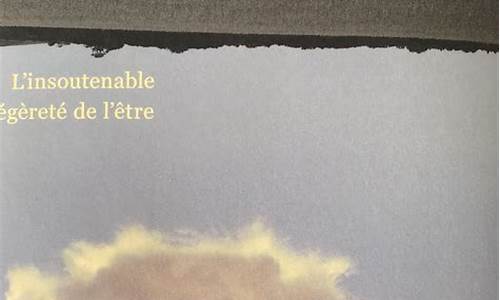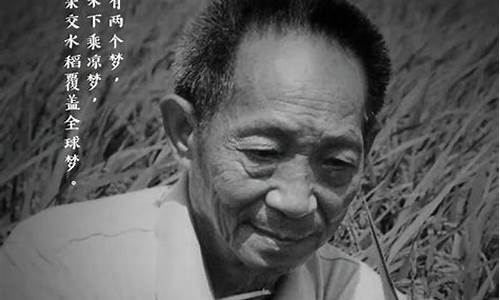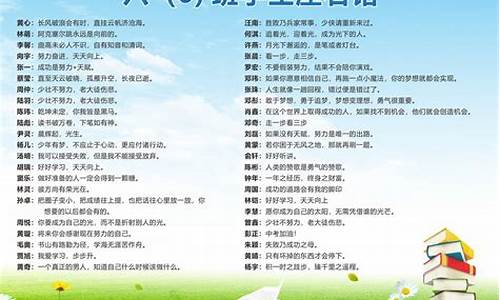您现在的位置是: 首页 > 情感语录 情感语录
英语单词短语句子抄写_英语单词短语和句子
tamoadmin 2024-10-19 人已围观
简介1.人教精通版小学英语(三年级起点)3-6年级所有单词、短语、句子2.寒假生活中见到的英语单词、短语、句子。3.人教版初三英语短语和重点句子,语法4.初二英语必备单词,句型,短语5.英语中短语和句子区别 举例?Unit 2复习要点 一、短语。 1. used to 过去常常 2. be afraid of 害怕… 3. over here 在这边 4. be interested in 对…感兴趣
1.人教精通版小学英语(三年级起点)3-6年级所有单词、短语、句子
2.寒假生活中见到的英语单词、短语、句子。
3.人教版初三英语短语和重点句子,语法
4.初二英语必备单词,句型,短语
5.英语中短语和句子区别 举例?
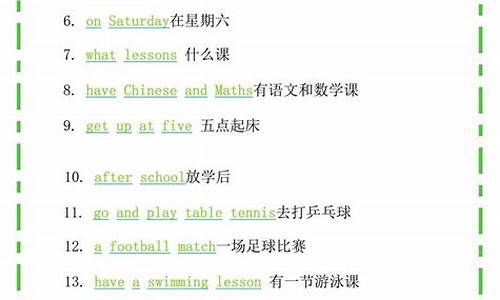
Unit 2复习要点
一、短语。
1. used to 过去常常 2. be afraid of 害怕…
3. over here 在这边 4. be interested in 对…感兴趣
5. on the swim team 游泳队的队员. 6. be terrified of 惧怕…
7. go to sleep 入睡 8. all the time 一直
9. chat with… 和…聊天 10.stressed out 感到紧张
11.cause trouble/problems 惹麻烦 12.pay for 付款
13.look after 照顾 14.do sth. as well as sb. can 尽可能好地…
15.gym class 体操课 16.in the end 最终
17.make a decision 下决心 18.head teacher 班主任
19.talk with 和…谈论 20.to one’s surprise 令某人吃惊的是
21.even though 尽管 22.no longer=not… any longer 不再
23.take pride in 对…感到自豪 24.pay attention to 对…注意
25.give up doing 放弃做… 26.change one’s mind 改变某人的主意
27.with the lights on 开着灯…. 28.chew gum a lot 经常咀嚼口香糖
29.spend time doing 花时间做… 30.take sb. to concerts 带某人去音乐会
31.daily life 日常生活 32.afford to do 负担得起
33.a seven-year-old boy 一个七岁大的男孩子34.be alone 单独
35.no more=not… any more 不再 36.get into trouble 遇到麻烦
37.get into trouble with 和…引起冲突. 38.worry about 担心
39.walk to school = go to school on foot 步行去上学
40.take the bus to school = go to school by bus 坐公车去上学
41.go right home 直接回家 42.waste time 浪费时间
43.play the piano 弹钢琴 44.speak in front of a group 在人群面前讲话
45. in the last few years 在过去的几年里 46.send messages 发信息
47.be able to 能够 48.be made up of … 由……组成的
49.sound like … 听起来像 50.instead of … 代替……
二、句型。
1.I used to be afraid of the dark. 我以前害怕黑暗.
2.I go to sleep with my bedroom light on. 我开着卧室的灯睡觉.
3.I used to spend a lot of time playing games with my friends.
以前我常常花很多时间和我的朋友们玩游戏.
4.I hardly ever have time for concerts. 我几乎没有时间去听音乐会.
5.My life has changed a lot in the last few years. 在过去的几年里我的生活变化很大.
6.It will make you stressed out. 那会使你紧张的.
7.It seems that Yu Mei has changed a lot. 玉梅似乎变化很大.
三、语法。
1. used to 过去常常做某事,暗指现在已经不存在的动作或状态. 后跟动词原形.
否定形式为: didn’t use to 或 use not to / usedn’t to
疑问形式为: Did…use to…? 或 Used…to…?
Eg. I used to be really quiet.
I didn’t use to like tests.
Did you use to play the piano? Yes, I did./ No, I didn’t.
=Use you to play the piano? Yes, I use. / No, I use not.
You used to be short, didn’t you? Yes, I did./ No, I didn’t.
2. wear 表示状态. put on 表示动作. dress + 人 给某人穿衣服.
3. on the swim team on 是…的成员,在…供职.
4. Don’t you remember me? 否定疑问句.
Yes, I do. 不, 我记得. No, I don’t 是的, 我不记得了.
5. be terrified of 害怕的程度比 be afraid of 深.
6. miss: ① 思念, 想念 例: I really miss the old days.
② 错过, 未中, 未赶上, 未找到.
例: I’m sorry that you miss the bus.
7. no more (用在句中)=not…any more (用在句尾) 指次数;
no longer (用在句中)=not…any longer (用在句尾) 指时间.
8. It seems that Yu Mei has changed a lot. = Yu Mei seems to have changed a lot.
9. afford + n. /pron. afford + to do 常与can, be able to 连用.
例: Can you afford a new car?
His mother couldn’t afford to pay for her child’s education.
10. alone = by oneself 独自一人. lonely 孤独的, 寂寞的.
11. in the last/past + 一段时间
during the last/past + 一段时间 与现在完成时连用.
12. die (v.) dead (adj.) death (n.) dying (垂的)
人教精通版小学英语(三年级起点)3-6年级所有单词、短语、句子
一.相近介词和介词短语
1. With the help of 在~~帮助下
under the leadership / care of 在~~领导/关心下
2. be strict with sb. 对~人要求严格
be strict in sth. 对~事要求严格
3. at present=at the present time 目前
for the present 暂时
4. in the sun/sunshine 在阳光下
under the sun 在世界上
5. lie in 位于~~之内
lie on 同~~接壤
lie to 位于~~之外
6. at least 至少
in the least 丝毫,一点
7. by name 名叫
in the name of 以~~名义
8. in the air 空中,在流传
on the air 播出
9. in the way 挡路,障碍,用~~方法
in a way 在某点上,在某种程度上
get one’s own way to do 随心所欲
give way 让步,屈服
lose one’s way 迷路
by the way 顺便说一下
on one’s way to 在去~~的路上
Come this way 这边走
10. at the corner 在拐角处(外角)
in the corner 在角落里(内角)
on the corner 在角落上(外角上)
11. judge by / from 根据~~来判断
judge for oneself 由某人自己来判断
12. at the end (of) 在~~结束时
at the beginning of 在~~开始时
at the back of 在~~背后,支持
at the age of ~~岁时
at the foot of 在~~脚下
at the bottom of 在~~底部
at the top of 在~~顶上
at/on the edge of 在~~边上
13. in the course of 在~~过程中
in the eyes of 从~~观点看来,在~~眼里
in the face of 面对~~,尽管,纵使
in the middle of 在~~中间
in the end =at last=finally 最后
14. on the eve of 在~~前夕
on the side of 在~~一边
15. after a time = after some time 过一段时间后
for a time = for some time 一时,有一段时间
16. behind time 迟到,过期
behind the times 落在时代后面
17. at no time 决不
in no time 立即,马上
18. at one time = once time 曾经
at a time = each time 每次
at times = sometimes 有时
at all times 经常,一直,始终
at the same time 同时
at the time 在~~的时候
by the time 到~~的时候
19. for a moment 一会儿
for the moment 暂时
at the moment 当时
the moment /minute /instance 正当~~一刹那
20. once or twice 一两次
more than once 不止一次
once more 重新,又
once upon a time 从前
once in a while 偶尔
二.归类记忆
1. be on show / display / play / sale / strike / duty / trial
2. be of value / importance / use / no use / color / age / size / height / weight / significance
3. to one’s joy / surprise / pleasure / astonishment / sorrow / delight
4. in surprise / wonder / alarm / terror / horror / delight
5. by air / bicycle / boat / bus / car / letter / post / plane / telephone / train / wire
6. at daybreak / sunrise / dawn / noon/ dark / night
7. out of breath / control / question / sight
8. in fact / reality / substance / nature / practice / theory / short / brief / a word / detail / all / average / full / time / fashion / existence / turn / vain / haste / appearance / common / sum/
general / particular / public / secret / order / part / power / stock / case / bed / future / name / addition / sight
9. on duty / shift / holiday / leave / business / purpose / time / sale / show / board / hand / record / request / root / earth / farm / principle
10. for example / instance / all / good / nothing / convenience / short / fear / sale
11. by weight ( volume size number~~ ) / profession / definition / rule / turn / chance/ accident/
mistake / hand / train ( bus ,taxi ,ship ,boat ~~) / air / land / force / day / nature / sight
12. at most / least / best / worst / once / first / last / home / school / will ( at will:任意) / work /
night / midnight / daybreak / dawn / present / length / large
13. as above / below / following / over / usual / before / a matter of fact
14. above all / measure / normal
15. before all / long / time / now / then
16. after all / class / school
17. out of action / order / condition / use / operation / step / joint / repair/ gear / balance / range/
doubt / date / danger / hand / shape / place / question / stock /
18. with caution / interest / difficulty / ease / advantage / effect / reason / vigor / reserve / success / confidence
19. beyond comprehension / conception / description / expression / doubt / control / reach / power / measure / grasp / compare / controversy / dispute / hope / example
20. under age / discussion / test / way / repair
三.组合记忆
(1)由两个词组成的复合介词.
1. 以of结尾
ahead of , aside of , because of , east of , west of , instead of , short of , lack of , regardless of
2. 以to结尾
according to , as to , counter to , due to , owing to , next to , previous to , prior to , apostle to ,
relative to , subject to , subsequent to , on to , thanks to
3. 以with结尾
along with , together with
4. 以for结尾
as for , but for , except for , save for
5. 以from结尾
from above , from below , from among , from between , from beneath , from behind ,
from over
(2)由三个词组成的复合介词.
1. 以in开头
in addition to , in advance of , in agreement with , in case of , in charge of , in comparison with
in consequence of , in consideration of , in (the) course of , in contrast with , in the face of ,
in favor of , in front of , in honor of , in (the) light of , in the middle of , in the name of ,
in need of , in obedience to , in opposition to , in place of , in preference to , in (the) process of
in regard to , in reply to , in respect of
2. 以by开头
by means of , by order of , by reason of , by virtue of , by way of
3. 以at开头
at the beginning of , at the cost of , at the end of , at the hands of , at mercy of , at the point of ,
at the risk of
4. 以with开头
with an eye to , with the exception of , with the purpose of , with reference to , with regard to,
with respect to , with a view to , with the view of
5. 以for开头
for the benefit of , for fear of , for lack of , for the good of , for the sake of
6. 以under开头
under cover of , under pain of , under the present of
7. 以on开头
on account of , on behalf of , on the occasion of , on the part of , on the point of , on top of
四.省略介词,意义不变
1. I will share (in) the pleasure with him.
2. I spent two hours (in) reading the article.
3. I’ll write (to) you a letter.
4. He plays (on) the piano every evening.
5. Smith has traveled (through) China.
6. They are fighting (against) their enemy.
7. Please fill (in) the blanks in the following.
8. The houses face (to/on) the south.
9. She scolded (at) her child yesterday.
10. It is (of) no use talking.
11. There is no use (in) talking.
12. We couldn’t prevent them (from) getting married.
13. He is busy (in) preparing for the exam.
14. I have studied English (for) ten years.
15. This shirt doesn’t fit (for) me.
16. I want a place to live (in) .
17. You ought to break (off) this habit.
18. She always share (in) my troubles as well as (in ) my jobs.
五.动词词组及短语
1. 以break为中心的词组
break away from 脱离,逃离
break down 破坏,粉碎;瓦解;出故障,抛锚
break in 闯进,打断;使顺服
break into 闯入;强行进入;突然开始
break out 爆发,发生;准备使用;起锚
break the law 违反法律
break the record 破记录
break one’s promise 失言
break up 开垦,破碎;解散,分开,分解
2. 以catch为中心的词组
be caught doing 被发现做某事
be caught in the rain 淋雨
catch a bus/train 赶汽车/火车
catch a cold 伤风,感冒
catch one’s word 听懂某人的话
catch sight of 发现,瞥见
catch up with 赶上,追及,追上
3. 以come为中心的词组
come across 偶尔发现,想起;越过;偿付
come along 一道来,陪伴;进步,进展;出现
come at 达到,求得,得到;扑向,袭击
come back 回来;恢复,复原
come down 倒下;降落;跌落;病倒
come from 来自,起源于,从~~产生,生于
come in 进来,进入;流行起来;获名次
come into being 发生,产生,出现,形成
come into power 开始执政,当权,当选
come into use 开始使用,获得应用
come on 上演;开始;赶快;发展;登台;(问题)被提出
come out 出来,传出;出版;结果是;褪色;(秘密)泄露
come to 苏醒,复原;共计;达到;归结于
come to an end 终止,结束
come to know 开始了解到
come true 实现,成为现实;证实
come up 走近;上楼;长出,发芽
4. 以do为中心的词组
be done in 精疲力竭
be done with 完全结束
do a good deed 做一件好事
do away with 去掉,废除;弄;浪费
do good to (=do sb. good) 有益于
do harm to (=do sb. good) 有害于
do its work 有效,有作用
do much 极有用
do wrong to 做错
do one’s best 尽某人最大努力
do one’s homework 做作业
do one’s utmost 尽力而为
do proud 足以使~~骄傲
do sb. justice 公平对待某人
do some cleaning (V+ing,etc.) 搞卫生
do sb. a favor 帮助某人
do well in 学得不错,干得漂亮
do with 和~~相处,忍受,处理
do without 不需要,不用
do wonders 创造奇迹
have much to do with 和~~很有关系
have nothing to do with 与~~无关
have something to do with 和~~有关
in doing so=in so doing 这时,在这种情况下
That will do. 行了;够了
5. 以get为中心的词组
get about 徘徊,走动,旅行;流传
get above oneself 自视高傲
get accustomed to 习惯于,对~~习以为常
get across 度过,通过,横过;说服,使理解
get ahead of 胜过,超过
get along 前进,进步;同意;离去
get along with 与~~相处
get at 发现,了解;掌握;攻击
get away 离开,逃脱
get back 取回,回来;报复
get behind 落后;识破
get down 咽下;写下;使沮丧,使抑郁
get down to 认真对待,静下心来
get familiar with 熟悉
get hold of 获得,取得
get home 到家
get in 进入,陷入;牵涉
get off 送走;脱下(衣服);下车;动身
get on 上车;穿上;进步,使前进;成功;相处
get upon with 进步;在~~方面获得成功
get one’s hand in 熟悉;习惯
get out of 由~~出来,从~~得出;避免;退休
get over 越过;恢复,痊愈;克服;完成
get ready for 为~~作准备
get rid of 除去,去掉;免除,摆脱
get through 到达,完成,通过;及格
get together 积聚,积累;商谈,取得一致意见
get up 起床,起立;研究,钻研;致力于;安排,组织
get used to 习惯于
have got to do 不得不,必须
6. 以give为中心的词组
be given to 沉溺于,癖好
give about 分配;传播
give and take 相互迁就
give away 赠送;牺牲;泄露;颁发
give back 归还
give cause 给予~~的理由
give ear to 侧耳倾听
give forth 发出,放出;发表
give in 屈服,让步,投降
give in to 同意,接受;向~~让步
give off 发出(烟,气味)
give oneself out to be/as 自称为
give oneself up to 专心于;向~~自首
give out 分发,公布
give place to 让位于,被~~所替代
give rise to 引起,导致;使~~发生
give sb. to understand 通知某人
give up 放弃;停止
give way to 让步,退却;屈服于
7. 以look为中心的词组
look about 四下环顾;查看
look after 照顾,看管
look around 东张西望
look at 注视,着眼于
look back 回顾
look for 寻找;期待,期望
look down on 俯视;轻视
look forward to 盼望,期待
look into 窥视;调查;浏览
look like 看起来象
look on 旁观;面向
look out 向外看;注意;当心,堤防
look over 从上面看过去;检查
look through 透过~~看去;看穿;浏览
look up to 仰望,尊敬
8. 以make为中心的词组
be made from 由~~原料制成
be made of 由~~材料制成
be made up of 由~~组成
make a fool of 愚弄,欺骗
make a mistake 弄错
make a point of doing 强调;认为~~重要;决心,坚持
make advantages/use of 使用,利用
make after 追求,追赶
make believe 假装
make certain 确信,把~~弄清楚
make contact with 接通,与~~接触,与~~联系
make for 去向,向~~前进;有利于
make friends with 和~~交友
make into 把~~制成,使~~转变为
make much of 重视;理解;赏识
make one’s mind on sth. 决定某事
make one’s own 当作自己的看待
make oneself at home 随便,别拘束
make out 填写;开支票;理解;辨认
make the best of 尽量利用;极为重视
make up 弥补,修理;赔偿,补偿;起草;编造;化装
make up to 接近,巴结;向~~求爱
make way for 为~~让路,让路于
on the make 急求成功;增加
9. 以put为中心的词组
put aside 把~~放在一边;搁置;排除
put away 把~~放好,把~~收拾;储藏;吃喝,吃掉
put back 把~~放回原处;驳回
put down 放下;镇压;制止;记下;削减;降落
put forward 提出;拨快;建议,推荐;提倡,倡议
put ~~ into 把~~放入;插入;翻译成
put off 推迟,延期;消除;推脱,推辞
put on 上演;穿上,带上
put one’s heart into 全神贯注,专心致志
put up 举起,挂起;提名,推荐;陈列
put up with 忍受,容忍
10. 以take为中心的词组
be taken aback 吃惊
take a seat 就坐
take a shower 淋浴,洗澡
take aim 瞄准,设立目标
take away 拿走,减去;夺去
take ~~ by surprise 出奇制胜
take care of 当心,注意;照顾;提防;谨慎;处理,对付;负责
take ~~ for 把~~当作
take off 脱去,除去;离开;起飞;模仿;起程;致;复制,作副本;减弱
take office 就职,上任
take one’s place 就坐,入坐
take one’s temperature 量体温
take part in 参与,参加
take place = happen 发生,举行
take the place of 代替
take pride in 以~~为荣,对~~骄傲
take sb. by the arm 拉某人的胳膊
take it easy 别着急,慢慢来
11. 以turn为中心的词组
give a new turn to 对~~予以新的看法
in one’s turn 轮到某人做某事
out of turn 不按次序的,不合适宜的
take one’s turn to do 轮到做
turn a blind eye to 对~~视而不见
turn against 背叛,采取敌对态度
turn back 折回,往回走
turn down 折叠,翻下,驳回,拒绝考虑
turn into 走进;变成,变为
turn to ~~for help 求助于
turn off 关上(自来水,电器开关);解雇,辞退;避开(问题);制造;生产
turn on 打开(自来水,电器开关);反对;依靠,依赖,取决于
turn one’s attention to 把注意力转向
turn out 培养;证明是;制成;实际情况是
turn out to be 原来是,证明是,结果是
turn over a new leaf 翻开新的一页,重新开始,改过自新
turn (a)round 旋转,转过身来;改变意见;采取新政策
turn to 变成;着手于
turn upside down 颠倒过来,翻过来;使陷入混乱
寒假生活中见到的英语单词、短语、句子。
girl女孩
teacher教师
student学生
this这,这个
my我的
friend朋友
I’m=Iam 我是
nice好的
good morning上午好
good afternoon下午好
meet遇见,碰见
goodbye再见
too也,太
welcome欢迎
人教版初三英语短语和重点句子,语法
单词:yacht、people、forget、youth、time。
短语:
1、a few=有些,几个
2、a great/gd deal f=大量(的),许多
3、a little=一点
4、a fraction of一部分
5、after all毕竟,究竟
句子:
1、例句:The yolk is the yellow part in an egg.
蛋黄是鸡蛋中的**部分。
2、例句:I should have simply Xeroxed this sheet for you.
我本应该只为你复印这张。
3、例句:It was peopled by a fiercely independent race of peace-loving Buddhists.
那里由极其独立的一群热爱和平的佛教徒居住着。
4、例句:People?were?talking animatedly.?
人们热烈地交谈着。
5、例句:We?called?white?people?by?their trade,?like?characters?in a?mystery?play.?
我们以职业头衔来称呼白人,就像神秘剧中的人物一样。
初二英语必备单词,句型,短语
Unit 2一、知识点1. used to 过去常常做某事,暗指现在已经不存在的动作或状态. 后跟动词原形. used to do sth. There used to be ….(反意疑问句)didn’t there?否定形式为: didn’t use to 或 usedn’t to疑问形式为: Did…use to…? 或 Used…to…?be/get used to doing sth.习惯于, to 为介词.2. wear 表示状态. =be in +颜色的词 put on 表示动作. dress + 人 给某人穿衣服.dress sb. / oneselfhave on表示状态(不用于进行时态)3. on the swim team on 是…的成员,在…供职.4. Don’t you remember me? 否定疑问句.(考点) Yes, I do. 不, 我记得. No, I don’t 是的, 我不记得了.5. 反意疑问句: ① 陈述部分的主语为 this, that, 疑问部分主语用it; 陈述部分主语用 these, those, 疑问部分用they 做主语.例: This is a new story, isn’t it? Those are your parents, aren’t they?② 陈述部分是 there be 结构, 疑问部分仍用 there例: There was a man named Paul, wasn’t there?③ I am 后的疑问句, 用aren’t I 例: I am in Class 2, aren’t I?④ 陈述部分与含有 not, no, never, few, little, hardly, seldom, neither, none 等词时,疑问部分用肯定.例: Few people liked this movie, didn’t they?但陈述句中若带有否定前缀或后缀的单词时, 这个句子仍视为肯定, 后面仍用否定.例: Your sister is unhappy, isn’t she?⑤ 陈述部分的主语若为不定式或 V-ing 短语, 疑问部分主语用it.例: To spend so much money on clothes is unnecessary, isn’t it?⑥ 陈述句中主语是 nobody, no one, everyone, everybody 等指人的不定代词时,疑问部分用they做主语; 若陈述部分主语是 something, anything, noting, everything 等指事物的不定代词时, 疑问部分用it 做主语.例: Nobody says one word about the accident, do they? Everything seems perfect, doesn’t it?⑦ 当主语是第一人称I时, 若谓动为think, believe, guess 等词时, 且其后跟宾丛,这时疑问句部分的人称, 时态要与宾语从句保持一致, 同时还要考虑否定转移.例: I don’t think he can finish the work in time, can he?⑧ 前面是祈使句, 后用 will you? (let’s 开头时, 后用shall we?)6. be terrified of 害怕的程度比 be afraid of 深.7. miss: ① 思念, 想念 例: I really miss the old days. ② 错过, 未中, 未赶上, 未找到. 例: It’s a pity that you miss the bus. The boy shot at the goal, but missed.8. no more (用在句中)=not…any more (用在句尾) 指次数; no longer (用在句中)=not…any longer (用在句尾) 指时间.9. right: ① adj. 正确的, 右边的② n. 右方, 权利③ adv. 直接地.10. It seems that Yu Mei has changed a lot. = Yu Mei seems to have changed a lot.11. afford + n. /pron. afford + to do 常与can, be able to 连用.例: Can you afford a new car? The film couldn’t afford to pay such large salaries.12. as well as 连词, 不但…而且… 强调前者. (若引导主语, 谓动与前者在人称和数上一致例: Living things need air and light as well as water. 生命不仅需要水, 还需要空气和阳光. I as well as they am ready to help you. 不仅是他们, 我也愿意帮助你.13. alone = by oneself 独自一人. lonely 孤独的, 寂寞的.14. in the last/past + 一段时间 during the last/past + 一段时间 与现在完成时连用.15. die (v.) dead (adj.) death (n.) dying (垂的)16. play the piano 弹钢琴17. ①be/ become interested in sth. 对…感兴趣②be interested in doing sth. 对做…感兴趣③show great interest in 在……方面产生极大的兴趣④a place of interest 一处名胜 some places of interest 如:He is interested in math, but he isn’t interested in speaking English. 他对数学感兴趣,但是他对说英语不感兴趣。⑤ interested adj. 感兴趣的,指人对某事物感兴趣,往往主语是人 ⑥ interesting adj.有趣的,指某事物/某人具有趣味,主语往往是物 ⑦ an interesting book / man 18. 害怕… be terrified of sth. 如:I am terrified of the dog. be terrified of doing sth. 如:I am terrified of speaking.19. on 副词,表示(电灯、电视、机械等)在运转中/打开,其反义词off.with the light on 灯开着20. walk to somewhere 步行到某处 walk to school 步行到学校21.spend 动词,表示“花费金钱、时间” ①spend…on sth. 在某事上花费(金钱、时间) ②spend…doing sth. 花费(金钱、时间)去做某事 如:He spends too much time on clothes. 他花费太多的时间在衣着He spend 3 months building the bridge.他花费了三个月去建这座桥。 pay for 花费如:I pay 10 yuan for the book. 我花了10元买这本书。 take动词 有“花费”的意思 常用的结构有: It take(s) sb. … to do sth. 如:It takes me a day to read the book.22. chat with sb. 与某人闲聊 如:I like to chat with him. 我喜欢和他聊天。23. worry about sb./ sth. 担心某人/某事 worry 是动词 be worried about sb./sth. 担心某人/某事 worried 是形容词 如:Don’t worry about him. 不用担心他。 Mother is worried about her son. 妈妈担心他的儿子。24. all the time 一直、始终25. take sb. to + 地方 送/带某人去某个地方 如: A person took him to the hospital. 一个人把他送到了医院。 Lui took me home. 刘把我送回了家。(home 的前面不能用to)26. hardly adv. 几乎不、没有 hard 困难的;猛烈地 hardly ever 很少 hardly 修饰动词时,通常放在助动词、情态动词之后,实义动词之前 助动词/情态动词+hardly hardly + 实义动词 如: I can hardly understand them. 我几乎不能够明白他们。I hardly have time to do it. 我几乎没有时间去做了。It rains hard outside, I could hardly go out.27. in the last few years. 在过去的几年内 常与完成时连用 如: I have lived in China in the last few years. 在过去的几年内我在中国住。28. be different from 与…不同 29. how to swim 怎样游泳 不定式与疑问词连用:动词不定式可以和what, which, how, where, when 等引导的疑问句连用,构成不定工短语。如: The question is when to start. 问题是什么时候开始。 I don’t know where to go. 我不知道去哪。30. make sb./ sth. + 形容词 make you happy make sb./ sth. + 动词原形 make him laugh31. move to +地方 搬到某地 如:I moved to Beijing last year.32.It seems that +从句 看起来好像…… 如: It seems that he has changed a lot. 看起来他好像变了许多。33. help sb. with sth. 帮某人某事 help sb. (to ) do sth. 帮某人做某事 She helped me with English. 她帮助我学英语。She helped me (to) study English。 她帮助我学习英语。34. fifteen-year-old 作形容词 15岁的 fifteen-year-olds 作名词指15岁的人 fifteen years old 指年龄 15岁 如:a fifteen-year-old boy 一个15岁的男孩Fifteen-year-olds like to sing. 15岁的人喜欢唱歌。I am fifteen years old . 我是15岁。35.支付不起…can’t /couldn’t afford to do sth. can’t / couldn’t afford sth. 如:I can’t/couldn’t afford to buy the car. I can’t/couldn’t afford the car. 我买不起这个辆小车。36. as + 形容词./副词+as sb. could/can 尽某人的…能力 如: Zhou run as fast as her could/can. 她尽她最快的能力去跑。37. get into trouble with 遇到麻烦 38. in the end 最后39. make a decision 下决定 下决心 40. to one’s surprise 令某人惊讶 如:to their surprise 令他们惊讶 to LiLei’s surprise令李雷惊讶41. take pride in sth. 以…而自豪 如: His father always take pride in him. 他的爸爸总是以他而自豪42. pay attention to sth. 对…注意,留心 如: You must pay attention to your friend. 你应该多注意你的朋友。43. be able to do sth. 能做某事 如: She is able to do it. 她能够做到。44. give up doing sth. 放弃做某事 如: My father has given up smoking. 我爸爸已经放弃吸烟了。 复合句与简单句的转化:① when ------ at the age of …② so…that…----- too… to…. / enough to …③ so that…------ in order to do sth.④ because…----- because of…⑤ if ….----- without / with…⑥ if…----- 祈使句+ and / or + 简单句⑦ 宾语从句----特殊疑问词+动词不定式⑧ be afraid be sure that +从句---- 动词不定式 be sorry⑨ It seems / seemed that sb….------ sb. seems / seemed to do sth.⑩ Sb. hopes / hoped that ….-------sb. hopes / hoped to do sth.二、 短语1. be more interested in 对…更感兴趣.2. on the swim team 游泳队的队员.3. be terrified of 害怕.4. gym class 体操课.5. worry about. 担心.6. all the time 一直, 总是7. chat with 与…闲聊8. hardly ever 几乎从不 9. walk to school = go to school on foot take the bus to school = go to school by bus 10. as well as 不仅…而且 11. get into trouble 遇到麻烦12. make a decision 做出决定 13. to one’s surprise 使某人吃惊的是14. take pride in 为…感到骄傲 15. pay attention to 留心, 注意16. consist of 由…组成/构成. be made up of 由…组成/构成.17. instead of 代替, 而不是 18. in the end 最后, 终于19. play the piano 弹钢琴 三、句子1.I used to be afraid of the dark. 我以前害怕黑暗.2.I go to sleep with my bedroom light on. 我开着卧室的灯睡觉.3.I used to spend a lot of time playing games with my friends. 以前我常常花很多时间和我的朋友们玩游戏.4.I hardly ever have time for concerts. 我几乎没有时间去听音乐会.5.My life has changed a lot in the last few years.6.It will make you stressed out. 那会使你紧张的.7.It seems that Yu Mei has changed a lot. 玉梅似乎变化很大. ——————————————————————这个吗?太多了。我用邮件发给你。接收以后再表示回应。
英语中短语和句子区别 举例?
初二英语知识点复习(总结版)
1.
take : 拿走
take sb. / sth. to someplace;
take sth. with you
bring: 带来
bring sth for a picnic
It’s going to rain, please take an umbrella with you.
You’d better finish your homework today and bring it to school tomorrow.
2.
keep + 名词 + 形容词
Keep the windows open, it’s hot here.
keep sb doing sth
I’m sorry I’ve kept you waiting for a long time.
keep表示“借”用于和一段时间连用:
How long can I keep this book?
3.
let / make / have sb do sth
让(使)某人干某事
Let’s go to the zoo!
How did he make the baby stop crying?
4.
forget to do sth
忘记去做某事
remember to do sth
记得去做某事
forget doing sth 忘记做过某事
remember doing sth
记得做过某事
5.
stop to do sth
停下来做另一件事情
stop doing sth
停止正在做的事情
stop sb from doing sth
阻止某人干某事
Let’s stop to have a test, it’s too hot today.
When the teacher came into the classroom, the students stopped talking.
We plant trees to stop the wind from blowing the earth away.
begin / start
to do sth
6.
tell / ask sb to do sth
否定形式 tell / ask sb not to do sth.
Policemen asked us not to play on the road , it was too dangerous.
Our P.E. teacher told us a story
yesterday.
7.
see / hear / watch sb do sth
see
/ hear /
watch sb doing sth
I heard him singing in the room when I passed by.
8.
enjoy sth ; enjoy doing sth ;
enjoy oneself = have a good time
Our classmates went to the zoo last Sunday. They enjoyed themselves.
9.
be busy with sth
be busy doing sth
They are all busy with their work.
10.
finish doing sth.
Tom didn’t go to bed until he finished writing the composition.
11.
want
sth
/
to do sth
/
sb to do sth
would like
sth
/
to do sth
/
sb to do sth
feel like doing sth.
He didn’t feel like eating anything.
12.
had better do sth
否定形式:
had better not do sth
You’d better not sing here, the baby is asleep.
13.
Why not do sth ?
=
why don’t you do sth ?
=
Why didn’t you do sth ?
Why not come with me?
14.
What about sth
/
what about doing sth ?
=
How about -----?
How about playing basketball with us?
15.
Thank you for sth /
Thanks for doing sth.
Thanks for your help.
------------
It’s a pleasure.
Thanks very much for helping me.
16.
instead往往放在句首或句尾
instead of sth
/
instead of doing sth.
通常放中间
He didn’t go to the park. He went to the cinema instead.
He went to the cinema instead of going to the park..
17.
put on
强调动作
wear 强调状态
in 介词,构成一个短词
Put on your old clothes tomorrow, because we’ll do some cleaning.
Kate is wearing a red sweater today.
The man in a blue suit is Mr. Li
18.
在if 引导的条件状语从句、以when , before, after , as soon as 引导的时间状语从句, 当主句是:一般将来时态、含情态动词或祈使句的情况下,从句用一般现在时表示将来时。
We’ll go hiking if it doesn’t rain tomorrow.
it doesn’t rain
=
it isn’t rainy
I’ll tell her the good news as soon as I see her.
同样的情况还适用于not ---- until 句型
I won’t go to bed until I finish my homework.
19.
在以when
引导的时间状语从句, 当从句是一般过去时态时,主句往往用过去进行时,表示在过去的某一时刻正在发生或正在进行的动作:
They were having supper when I got to their home.
20.
It’s time for sth /
It’s time to do sth /
It’s time for sb to do sth.
It’s time for us to start our lesson now.
21.
It takes /
It took /
It will take
somebody some time to do something.
It took them twenty minutes to finish the cleaning.
It will take us about ten hours to finish our homework.
22.
it 作形式主语或形式宾语,其真正的主语或宾语是后面带to 的动词不定式:
It’s necessary to learn English well.
We found it difficult to work out the maths problems.
23.
too ----
to 句型,
too ---- for sb to
do sth ----,对某人来说太-----以致于不能-----
The apples on the
tree
are too high for me to reach.
Kate is too young to go to school.
24.
enough 用法:形前名后, big enough
enough food
----- enough to do sth
足够-------能够-------
Jim is old enough to go to school.
25.
little , a little 修饰不可数名词 ;
much 修饰不可数
few a few 修饰可数名词;
many 修饰可数
a little
a few 具有肯定含义little few 具有否定含义
some, any , a lot of = lots of 既可以 修饰不可数,也可以修饰可数名词;
There
is a little time left, take it easy.
We’d better go shopping ,there are few eggs left.
Mr. Little doesn’t have much money. (否定句中常用much而不用a lot of )
26.
much too 中心词是too, 常修饰形容词,
It’s much too cold today,
we should wear warm clothes.
too much中心词是much, 常修饰不可数名词,
There’s too much water,
please be careful..
27.
有关情态动词的问答:
May I ------?
No, you can’t.
No, you mustn’t.
Must I /
we
-----?
No, you needn’t.
要注意could 和can的区别:could可表示语气的委婉,也表示过去的能力
Could you help me ?
Could she swim when she was four years old?
要注意must 和have to 的区别:must强调主观, have to 强调客观
要注意maybe和 may be的区别 : maybe在句中作谓语
Maybe it’s here.
It may be here.
28.
不定代词:someone, anyone ; something , anything , nothing ; somebody , anybody, nobody.
Something常用于肯定句和表示请求的疑问句中 , anything用于否定句中和疑问句中,not anything = nothing
without anything =
with nothing
Would you like something to eat?
I’d like Chinese tea with nothing in it .
形容词修饰不定代词要放在不定代词后面:
Be quiet! I have something important to tell you.
Is there anything interesting in today’s newspaper?
29.
反身代词: myself, yourself, himself, herself, itself, ourselves, yourselves, themselves.
要记住:一、二人称用物主,第三人称用宾格, 复数self要变selves
和反身代词有关的一些词组:enjoy oneself.
= have a good time.
learn by oneself,
leave one by oneself
She had to teach her son herself.
I don’t need your help, I can do it myself.
30.
形容词修饰名词,副词修饰动词:
What a strong wind!
It’s blowing strongly.
连系动词:be, feel, look, get,
turn , taste, smell, become,
+ 形容词作表语
31.
感叹句:What + a/an + 形容词 + 可数名词的单数形式+ 主语+ 谓语!
What+ 形容词+ 可数名词的复数形式 / 不可数名词+ 主语+ 谓语!
How + 形容词或副词 + 主语+ 谓语!
What a nice day it is !
What beautiful flowers they are!
How happily they are playing!
32.
反意疑问句:要注意前肯后否,前否后肯,要用be动词,助动词或情态动词来做,
要注意否定词:never, little, few, hardly ,nothing, nobody 等
祈使句的反意疑问句用:will you ?
以Let’s开头的反意疑问句用: shall we ?
She usually gets up at six, doesn’t she?
There’s little water in the bottle, is there?
Please take these
books to the office, will you?
You have never been to New York, have you?
33.
形容词和副词的比较级和最高级:要注意比较级和最高级的构成:
规则变化: 要双写的:big, fat, thin, red,
不规则变化:good,
bad,
far,
ill,
比较级用在:than ,
a little + ,
much + ,
最高级用在:
of all, of the three, in his class, in the world等表示有范围的短语中,
one of + 最高级 + 可数名词的复数
34.
以so 引导的倒装句:表示-----也一样,也如此,前后主语要不一致,要通过be动词、助动词、情态动词来做:
I reached home at 9:00, so did my brother.
Canadians eat a lot of beef, so do Chinese people.
35.
either---or----, neither ---- nor ----
连接两个主语,谓语动词采用就近原则;
Either of ----或 Neither of ------谓语动词用单数;
Both of
------或 both
---- and -----谓语动词用复数
Both of them are Chinese.
Neither of them is Australian.
Neither Jim nor I am American.
短语是字与字的连接构成一个意群.
而句子是由各个成分(至少有主语+谓语)的结合.
短语
put up
a piece of paper
the swimming pool
句子
I love you
I love you and you love me.
I think you are right.
很高兴为你解答!
多谢你的问题!,4,短语成分不完整,句子里成分完整。
比如:stay up late 是短语,“熬夜”
I stayed up late 是句子,“我熬夜了。”,1,what he said is wrong是一个完整的句子,广义的来讲,一个句子一定要有主、谓、宾语,而主谓宾可分别由一个单词或者几个单词构成的短语组成。
what he said 是一个短语,他说的话,相当于一个名词
is是个be动词,也相当于一个动词,做谓语
wrong是形容词,作表语(相当于主谓宾中的宾语)...,1,


